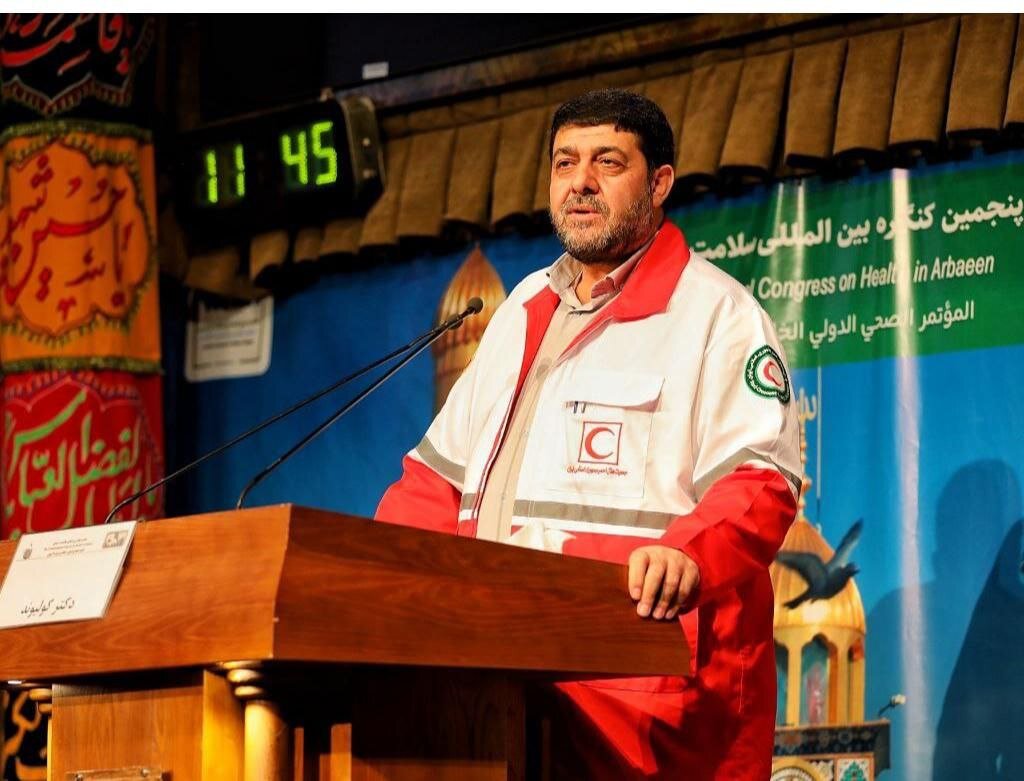IRCS highlights principles to manage Arbaeen, improve services

TEHRAN – The head of the Iranian Red Crescent Society (IRCS), Pirhossein Kolivand, has elaborated on eight main principles used to manage Arbaeen and improve services during the pilgrimage.
These principles, which aim to improve the cultural, humanitarian, and international coordination, have optimized the way services are provided, the IRCS website quoted Kolivand as saying.
Unity management is the key to the Arbaeen pilgrimage; institutions, departments, as well as relief, service, cultural, and security organizations must operate as a coordinated network, Kolivand said while addressing the fifth international congress on Health in Arbaeen.
Service provision, discipline in safeguarding pilgrims’ health are among the most fundamental pillars of this great movement.
The official mentioned the messages by the heads of the International Red Cross and Red Crescent Society, which lauded Arbaeen congress measures and achievements, as an example of the international impact of the event.
Improving medical, relief, cultural, and welfare services on the routes leading to Karbala is one of the other main principles; it includes establishing new infrastructures such as hospitals, mobile medical centers, and smart systems.
The official highlighted the importance of developing public participation and people-centered activities, saying that volunteers are the backbone of the movement, as the services are all provided by them.
Addressing people’s demands and managing their expectations is another important principle, he noted.
Another significant principle is honoring Iraq as the main host. “We are guests in Iraq, so we have to implement any measures in cooperation with Iraqi officials, the nation, and their customs,” Kolivand further noted.
Having a civilizational, futuristic, and global outlook was the last point mentioned by the official. All the programs need to be developed based on a civilizational perspective; Arbaeen is not just an annual event, but a global and civilizational movement that can be a model for the expansion of human synergy through goodness and peace.
IRCS dispatches over 8,000 rescue workers to Iraq for Arbaeen
A total of 8,200 rescue workers of the Iranian Red Crescent Society (IRCS), including relief workers, physicians, and nurses, offered services to people in Iraq during the Arbaeen pilgrimage in 2025, according to the head of the IRCS.
“Moreover, some 7,000 IRCS forces are working in the country on the routes and borders,” IRIB quoted Pirhossein Kolivand as saying.
Arbaeen, commemorating Imam Hussein’s martyrdom on the 40th day after Ashura, is the world’s largest annual pilgrimage. This year it fell on August 14.
Each year, millions of Shia believers trek the 80-kilometre Najaf–Karbala route in a faith-driven, transnational movement that embodies Islamic unity, solidarity, and the enduring call for justice.
“Four hospitals will provide services on the Najaf – Karbala highway. Also, the number of medical mawkibs (voluntary stations) has increased in Kabala, Najaf, and Samarra,” he added.
“Pilgrims will be able to benefit from medical, health, and nutritional consultations through mobile applications free of charge,” Kolivand noted.
The official went on to say that the IRCS would use more than 200 special vehicles and ambulances to perform their tasks during the Arbaeen pilgrimage.
FM lauds IRCS services
Foreign Minister Abbas Araghchi commended the IRCS services provided to people during the Arbaeen pilgrimage.
“The number of referrals to the IRCS clinic in Iraq is very high,” Araghchi said, adding that from 3:00 to 9:00 am, some 800 pilgrims visited the center, and the number of patients would even reach 4,000 during the day.”
He made the remarks while paying a visit to a medical center run by the IRCS in the shrine city of Najaf, Iraq.
“They offer a wide range of services, such as visiting patients, administering injections and serums, which is praiseworthy. Words cannot express gratitude and appreciation to the voluntary services,” the IRCS website quoted Araghchi as saying.
From July 26 to August 14, the IRCS provided health services to some 4.1 million pilgrims. The IRCS health staff visited 1.05 million patients. About 1.39 million pilgrims benefitted from para-clinic services (like serum therapy, wound dressing), and 1.6 million others received medicines. During the same period, the IRCS staff also transferred some 249 wounded or dead individuals from Iraq to the country.
MT/MG
Leave a Comment